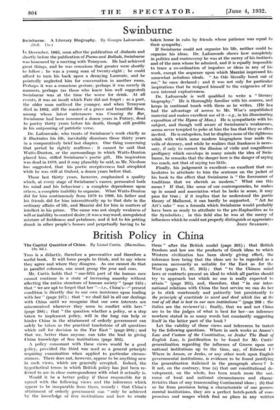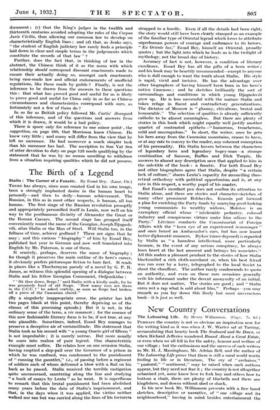British Poll cy in China
Tins is a didactic, therefore a provocative and therefore a useful book. It will force people to think, and to say where they agree and where they disagree. As one cannot do that in parallel columns, one must group the pros and cons.
Mr. Curtis holds that " one-fifth part of the human race cannot continue in a state of increasing anarchy without affecting the entire structure of human society " (page 245) ; that " we are apt to forget that her "—i.e., China's—" present condition is directly due to our own insistence upon trading with her " (page 247) ; that " we shall fail in all our dealings with China until we recognize that our own interests are misconceived wherever they seem to conflict with hers " (page 288) ; that " the question whether a policy, or a step taken to implement policy, will in the long run help or hinder China in the attainment of orderly government can safely be taken as the practical touchstone of all questions which call for decision in the Far East " (page 288) ; and that we, better than anyone, can take the lead in giving China knowledge of free institutions (page 302).
A policy consonant with these views would be a good policy, provided the third was used as a general principle requiring examination when applied to particular circum- stances. There does not, however, appear to be anything new in such views, which are generally accepted. Indeed, the hypothetical terms in which British policy has just been re- ferred to are in close correspondence with what it actually is.
Would it be a better policy if those responsible for it agreed with the following views and the inferences which appear to be inseparable from them, namely : that China's attainment of orderly government can " only be achieved by the knowledge of free institutions and hoW to create them " after the British model (page 301) ; that British freedom and law are the products of Greek ideas to which Western civilization has been slowly giving effect, the inference here being that the ideas are to be regarded as a panacea necessarily as suitable for the East as for the West (pages 15, 67, 265) ; that " to the Chinese mind laws or contracts present an ideal to which all parties should try to approach but which no one is really expected to attain " (page 265), and, therefore, that " in our inter- national relations with China the best service we can do her is to stick courteously and patiently but persistently to the principle of exactitude in word and deed which lies at the root of all that is best in our own institutions" (page 268 : the italics are the reviewer's) ; filially, that we and not China are to be the judges of what is best for her—an inference nowhere stated in so many words but constantly suggesting itself in the latter part of the book ?
Let the validity of these views and inferences be tested by the following questions. Where in such works as Anson's Law and Custom of the Constitution, or Jenks' The Book of English Law, is justification to be found for Mr. Curtis generalization regarding the influence of Greece upon our national institutions up to the time, say, of Edward I ? Where in Anson, or Jenks, or any other work upon English governmental institutions, is evidence to be found justifying the generalization italicized in the paragraph above ? Is it not, on the contrary, true (a) that our constitutional de- velopment, on the whole, has been much more the out- come of local and national circumstances and charac- teristics than of any transcending Continental ideas ; (b) that so far from precision being a characteristic of our govern- mental institutions, they are a perfect hotch-potch of com- promises and usages which find no place in any written
document ; (e) that the King's judges in the twelfth and thirteenth centuries avoided adopting the rules of the Corpus Juris Cit7lis, thus allowing our common law to develop on characteristically English lines ; and (d) that, as Jenks says, "the student of English judiciary law rarely finds a principle laid down in clear and simple terms in the judgements which constitute the records of that law " ?
Further, does the fact that, in thinking of law in the abstract, the Chinese think of it as the norm with which relationship should correspond discount enactments made to ensure their actually doing so, amongst such enactments being case-made law and official endorsements of unofficial regulations, like those made by guilds ? Finally, is not the inference to be drawn from the answers to these questions this : that what has proved good and useful for us is likely to prove good and useful for China only in so far as Chinese circumstances and characteristics correspond with ours, as fortunately not a few of them do ?
In so far as British policy followed Mr. Curtis' disregard of this inference, and of the questions and answers from which it is drawn, it would be a had policy.
There is space only for reference to one minor point , the suggestion, on page 280, that Morrisson knew Chinese- lie knew very little ; and many will differ from the view that lie left no successor. He had moreover a much simpler task than his successor has had. The ascription to Sun Tat Sen of utter devotion to duty on page 123 needs qualifying by the statement that he was by no means unwilling to withdraw from a situation requiring qualities which Ile did not possess.





































 Previous page
Previous page